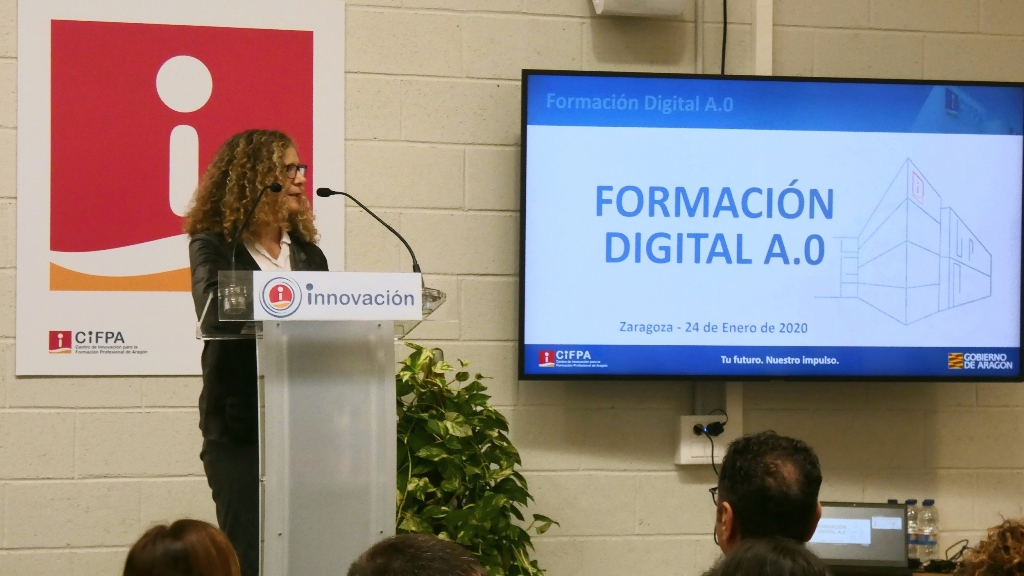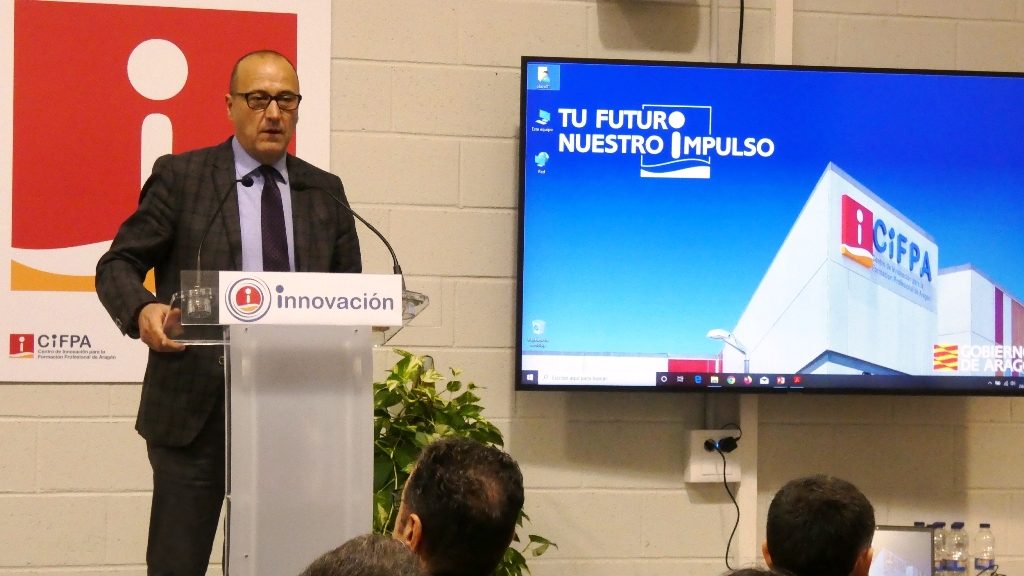
24 Jan Conference on Digitisation in Vocational Training and Campus A.0
Education will include digital content in all cycles of vocational training
Felipe Faci opened a meeting of teachers in which aspects related to the digital transformation and the A.0 Campus were discussed.
The food and automotive clusters, TECNARA and CAAR, participated in the meeting to discuss with them the extension of dual vocational training.

Promoting training in digital skills, as well as addressing the implementation from the next course of content related to digitalization of a cross-cutting nature in all cycles of Vocational Training that are taught in Aragon are two of the proposals that the Minister of Education, Culture and Sport of the Government of Aragon, Felipe Faci, announced this morning during the conference held at CIFPA (Innovation Center for Vocational Training in Aragon). In this way, the Autonomous Community is once again at the head of the whole national territory in promoting teaching that aims to train students in the skills needed to access new jobs.
The digital transformation taking place not only in society but also in industry is changing jobs and requiring new and varied skills from employees. For this reason, and in order to anticipate this transformation, the Government of Aragon intends to train its students to be able to adapt to the new needs of the labour market. A line of work that focuses the philosophy of Campus A.0, a physical and virtual space created to transform the Vocational Training of Aragon and that aims to promote the qualification of people who will live and work in the society of the future. A space that combines training, qualification and employment.
In line with this line of work, the Directorate General for Innovation and Vocational Training will promote a transversal module on digitalisation for the next school year, which will be included in all Vocational Training cycles. To this end, a complete training itinerary in this area has been prepared for teachers, so that they can include knowledge in digital technologies by applying them to their professional family.
This training will be carried out in two stages:
- On the one hand, the initiation/discovery of digitization will be promoted: Through ITAINNOVA's Smart Labs, Vocational Training teachers will be able to discover and understand the main technologies of Industry 4.0 as well as learn about the different uses and applications in their field. They are 4-hour days that are replicated 4 times, three in the morning and one more in the afternoon, during the month of February 2020. The number of teachers who will be able to carry out this training is 45 people per session, so 180 teachers will be reached with this initiative.
- In addition, the training of vocational training teachers in Industry 4.0 will be promoted. 8 different courses are presented in which each of the technologies of the sector and the applications they have in each of the professional families are deepened: Internet of things, Mobile and collaborative robotics, Intelligent logistics, Artificial intelligence, Big data and Data analytics tools, Blockchain, Additive manufacturing, Virtual and augmented reality.
These courses will be held in May 2020, with a format that combines classroom sessions with online training through the ITAINNOVA platform. The teachers who receive this training will carry out a digital activation project which will include the technology studied in applications for each professional family. Each course will be aimed at 15 teachers, up to a total of 120.
The aim is for this training to become the necessary catalyst for carrying out innovation projects in digitalisation in vocational training centres during the 2020/2021 academic year. In this call, a priority category of digitisation projects will be created to develop those initiatives that have been addressed during the training.
On another front, in an effort to anticipate the transformation that this digital change will imply in jobs, the Government of Aragon is working with the food (Tecnara) and automotive (CAAR) clusters to develop specialization programs that will offer specific training for specific jobs demanded by companies in our environment.
The specialization programs that have already been designed and that were presented during this morning's event, and that will be carried out in a dual format, are the following:
(a) Digital transformation (Internet of Things, IoT)
b) Cloud Computing
c) Team leaders in the highly automated automotive industry
The centres where these specialisation programmes will be implemented from September 2020 will be the CPIFP Corona de Aragón and CIFPA (highly automated automotive industry team leaders) and the CPIFP Los Enlaces (Cloud Computing and Digital Transformation, IoT).
Source: Aragon Today

